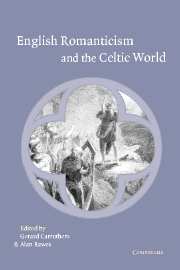Book contents
- Frontmatter
- Contents
- List of contributors
- Acknowledgements
- 1 Introduction: romancing the Celt
- 2 Sir William Jones, the Celtic Revival and the Oriental Renaissance
- 3 The critical response to Ossian's Romantic bequest
- 4 Blake and Gwendolen: territory, periphery and the proper name
- 5 The Welsh American dream: Iolo Morganwg, Robert Southey and the Madoc legend
- 6 Wordsworth, North Wales and the Celtic landscape
- 7 The force of ‘Celtic memories’ in Byron's thought
- 8 Shelley, Ireland and Romantic Orientalism
- 9 Byron and the ‘Ariosto of the North’
- 10 Scott and the British tourist
- 11 Felicia Hemans, Byronic cosmopolitanism and the ancient Welsh bards
- 12 Luttrell of Arran and the Romantic invention of Ireland
- 13 Contemporary Northern Irish poets and Romantic poetry
- Notes
- Bibliography
- Index
11 - Felicia Hemans, Byronic cosmopolitanism and the ancient Welsh bards
Published online by Cambridge University Press: 22 September 2009
- Frontmatter
- Contents
- List of contributors
- Acknowledgements
- 1 Introduction: romancing the Celt
- 2 Sir William Jones, the Celtic Revival and the Oriental Renaissance
- 3 The critical response to Ossian's Romantic bequest
- 4 Blake and Gwendolen: territory, periphery and the proper name
- 5 The Welsh American dream: Iolo Morganwg, Robert Southey and the Madoc legend
- 6 Wordsworth, North Wales and the Celtic landscape
- 7 The force of ‘Celtic memories’ in Byron's thought
- 8 Shelley, Ireland and Romantic Orientalism
- 9 Byron and the ‘Ariosto of the North’
- 10 Scott and the British tourist
- 11 Felicia Hemans, Byronic cosmopolitanism and the ancient Welsh bards
- 12 Luttrell of Arran and the Romantic invention of Ireland
- 13 Contemporary Northern Irish poets and Romantic poetry
- Notes
- Bibliography
- Index
Summary
Felicia Dorothea Hemans (1793–1835) considered Wales the ‘Green land of [her] childhood, [her] home and [her] dead’. As Peter W. Trinder observes, Hemans ‘spent all but the first and last few years of her life [in Wales], and all her happy years’. She composed the poetry for the first number of A Selection of Welsh Melodies (1821), addressed Wales and its scenery in such poems as ‘Written in North Wales’, ‘The Vale of Clwyd’, ‘The Scenes of Conway [Conwy]’, ‘A Farewell to Wales’, and ‘The River Clwyd in North Wales’, and is included in a series of volumes sponsored by the Welsh Arts Council, Writers of Wales (1984). Hemans was, however, neither born in Wales nor of Welsh extraction: she was born in Liverpool to a Venetian-German mother and an Irish father. Moreover, she situated the overwhelming majority of her poems outside of Wales. Unlike the Welsh poet Ann Griffiths (1776–1805), she wrote in English rather than Welsh, although Trinder speculates that ‘she could read and understand the Welsh language sufficiently for us to accept that the translations contained in [A Selection of Welsh Melodies] may be her own originals rather than paraphrases’. According to Jane Aaron, Hemans's poetry is ‘characteristic of English culture’ during the Romantic era, and ‘the depth of her commitment to the [Welsh] nationalistic cause can be gauged by the fact that the author of “Owen Glyndwr's War-Song” was also the author of “The Stately Homes of England”’.
- Type
- Chapter
- Information
- English Romanticism and the Celtic World , pp. 167 - 181Publisher: Cambridge University PressPrint publication year: 2003
- 1
- Cited by



